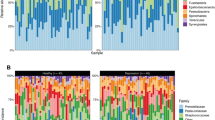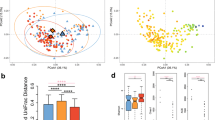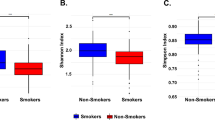Abstract
Background: While a substantial body of research has been dedicated to exploring the influence of alterations in the brain-gut-microbiome axis on conditions like depression and other mental disorders, there has been comparatively less focus on understanding how the oral microbiome affects brain function, particularly in response to smoking. Depression has been found to have a potential connection with oral dysbiosis, a condition that has shown associations with various disorders.
Methods: We conducted an analysis of the oral saliva microbiome data (accession number: PRJEB44565) from a cohort of 44 adult participants to explore the link between oral microbiome composition and depression, with a particular focus on distinguishing between smokers and nonsmokers. Our study involved a comparison of salivary microbiome data between individuals with depression (n = 22) and a matched control group (n = 22). Within the depressed cohort, we further stratified participants into two subgroups: smokers (n = 11) and nonsmokers (n = 11). To analyze the microbiome data, we employed the SRA Toolkit for gut microbiome data retrieval and conducted taxonomic classification and diversity assessments using the EZBioCloud server.
Results: We observed significant disparities in both the abundance and diversity of the oral microbiome when comparing smokers to nonsmokers. In the salivary microbiome of smokers who were part of the depressed cohort, the predominant phyla were Bacteroidetes (37.91%), Firmicutes (24.43%), Proteobacteria (22.70%), Fusobacteria (7.26%), and Actinobacteria (5.88%). Conversely, among nonsmokers, the dominant phyla were Bacteroidetes (34.57%), Proteobacteria (28.33%), Firmicutes (23.17%), Actinobacteria (6.93%), and Fusobacteria (5.79%). Moreover, we observed significant disparities in oral microbiota diversity between the two groups, with smokers exhibiting a lower level of diversity in their salivary microbiome.
Conclusion: This study unveils a potential link between the oral microbiome's composition and the presence of depression, both in smokers and nonsmokers. Changes in the oral microbiota, particularly the prevalence of specific bacterial species, could be associated with the development of depression.
Access this chapter
Tax calculation will be finalised at checkout
Purchases are for personal use only
Similar content being viewed by others
References
Wingfield, B., et al.: Variations in the oral microbiome are associated with depression in young adults. Sci. Rep. 11, 1–9 (2021)
Simpson, C.A., et al.: Oral microbiome composition, but not diversity, is associated with adolescent anxiety and depression symptoms. Physiol. Behav. 226, 113126 (2020)
Li, C., et al.: A genetic association study reveals the relationship between the oral microbiome and anxiety and depression symptoms. Front. Psychiatry 13, 960756 (2022)
Al Bataineh, M.T., et al.: Altered composition of the oral microbiota in depression among cigarette smokers: a pilot study. Front. Psychiatry 13 (2022)
Maitre, Y., et al.: Did the brain and oral microbiota talk to each other? A review of the literature. J. Clin. Med. 9, 3876 (2020)
Wu, J., et al.: Cigarette smoking and the oral microbiome in a large study of American adults. ISME J. 10, 2435–2446 (2016)
Mason, M.R., Preshaw, P.M., Nagaraja, H.N., Dabdoub, S.M., Rahman, A., Kumar, P.S.: The subgingival microbiome of clinically healthy current and never smokers. ISME J. 9, 268–272 (2015)
Yakar, N., et al.: Oral health and emotional well-being in premenopausal and postmenopausal women: a cross-sectional cohort study. BMC Womens Health 21, 1–9 (2021)
Pennisi, E.: Gut bacteria linked to mental well-being and depression (2019)
Levert-Levitt, E., et al.: Oral microbiota signatures in post-traumatic stress disorder (PTSD) veterans. Mol. Psychiatry 27, 4590–4598 (2022)
Lana, D., Giovannini, M.G.: The microbiota–gut–brain axis in behaviour and brain disorders. Int. J. Mol. Sci. 24, 8460 (2023)
Tuganbaev, T., Yoshida, K., Honda, K.: The effects of oral microbiota on health. Science 376, 934–936 (2022)
Maki, K.A., Kazmi, N., Barb, J.J., Ames, N.: The oral and gut bacterial microbiomes: similarities, differences, and connections. Biol. Res. Nurs. 23, 7–20 (2021)
Rodríguez-Rabassa, M., et al.: Cigarette smoking modulation of saliva microbial composition and cytokine levels. Int. J. Environ. Res. Public Health 15, 2479 (2018)
Huang, C., Shi, G.: Smoking and microbiome in oral, airway, gut and some systemic diseases. J. Transl. Med. 17, 1–15 (2019)
Martínez, M., et al.: The role of the oral microbiota related to periodontal diseases in anxiety, mood and trauma-and stress-related disorders. Front. Psychiatry 12, 2650 (2022)
Costalonga, M., Herzberg, M.C.: The oral microbiome and the immunobiology of periodontal disease and caries. Immunol. Lett. 162, 22–38 (2014)
Bardell, D.: Viability of six species of normal oropharyngeal bacteria after exposure to cigarette smoke in vitro. Microbios 32, 7–13 (1981)
Shanahan, E.R., et al.: Influence of cigarette smoking on the human duodenal mucosa-associated microbiota. Microbiome 6, 1–12 (2018)
Hou, K., et al.: Microbiota in health and diseases. Signal Transduct. Target. Ther. 7, 135 (2022)
Troubat, R., et al.: Neuroinflammation and depression: a review. Eur. J. Neurosci. 53, 151–171 (2021)
Donoso, F., Cryan, J.F., Olavarría-Ramírez, L., Nolan, Y.M., Clarke, G.: Inflammation, lifestyle factors, and the microbiome-gut-brain axis: relevance to depression and antidepressant action. Clin. Pharmacol. Ther. 113, 246–259 (2023)
Yang, J., et al.: Landscapes of bacterial and metabolic signatures and their interaction in major depressive disorders. Sci. Adv. 6, eaba8555 (2020)
Szalontay, A.-S., Grigorici, A.-E., Prisacariu, C.-Ș., Nedelcu, C.E., Macovei, G.: The impact of depression on oral health condition. Rom. J. Oral Rehabil. 13 (2021)
Goyal, S., Jajoo, S., Nagappa, G., Rao, G.: Estimation of relationship between psychosocial stress and periodontal status using serum cortisol level: a clinico-biochemical study. Indian J. Dent. Res. 22, 6 (2011)
Huang, Y., et al.: Possible association of Firmicutes in the gut microbiota of patients with major depressive disorder. Neuropsychiatr. Dis. Treat., 3329–3337 (2018)
Author information
Authors and Affiliations
Corresponding author
Editor information
Editors and Affiliations
Rights and permissions
Copyright information
© 2024 The Author(s), under exclusive license to Springer Nature Switzerland AG
About this paper
Cite this paper
El Kettani, Z. et al. (2024). Association Between Oral Microbiome Composition and Depression in Smokers and Nonsmokers. In: Ezziyyani, M., Kacprzyk, J., Balas, V.E. (eds) International Conference on Advanced Intelligent Systems for Sustainable Development (AI2SD’2023). AI2SD 2023. Lecture Notes in Networks and Systems, vol 905. Springer, Cham. https://doi.org/10.1007/978-3-031-52385-4_13
Download citation
DOI: https://doi.org/10.1007/978-3-031-52385-4_13
Published:
Publisher Name: Springer, Cham
Print ISBN: 978-3-031-52384-7
Online ISBN: 978-3-031-52385-4
eBook Packages: Intelligent Technologies and RoboticsIntelligent Technologies and Robotics (R0)




